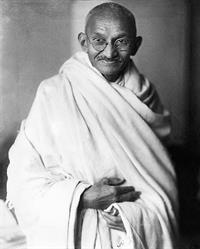PDF chapter test TRY NOW
But what am I to do then? A letter can hardly take the place of a talk; at best it is a one-sided affair. Imagine that I have made a suggestion to you for you to think over, as if we really were having a talk.
In history we read of great periods in the life of nations, of great men and women. Do you remember how fascinated you were when you first read the story of Joan of Arc, and how your ambition was to be something like her? Ordinary men and women are not usually heroic. They think of their bread and butter, of their children, of their household worries and the like. But a time comes when a whole people become interested in a great cause. Then history helps even simple, ordinary men and women to become heroes. Great leaders have something in them which inspires a whole people and makes them do great deeds. In India a great leader, full of love for all who suffer and eager to help them, has inspired our people to great actions and noble sacrifice. He has helped to make the starving, the poor and the oppressed free and happy.
In history we read of great periods in the life of nations, of great men and women. Do you remember how fascinated you were when you first read the story of Joan of Arc, and how your ambition was to be something like her? Ordinary men and women are not usually heroic. They think of their bread and butter, of their children, of their household worries and the like. But a time comes when a whole people become interested in a great cause. Then history helps even simple, ordinary men and women to become heroes. Great leaders have something in them which inspires a whole people and makes them do great deeds. In India a great leader, full of love for all who suffer and eager to help them, has inspired our people to great actions and noble sacrifice. He has helped to make the starving, the poor and the oppressed free and happy.
Bapuji is in prison, but the magic of his message has stolen the hearts of India’s millions. Men and women, and even little children, come out of their little shells and become India’s soldiers of freedom. In India today we are making history, and you and I are fortunate to see this happening before our eyes and to take some part ourselves in this great drama.
Explanation:
Nehru then asked what he could do then apart from writing letters. As he was in prison, he could only write letters to his daughter. He claims that a letter cannot take the place of a conversation. Even though it is a one-sided affair, writing a letter is a good thing. In this letter, the term "one-sided affair" is used to characterise one person's opinions or sentiments. He also advised his daughter to think over his suggestion. If she keenly observed that, she would understand that the letter appeared to be written in the form of a conversation.
Nehru said that they have learnt about significant periods in the lives of nations and great men and women in history. He then questioned if she remembered how interested she was when reading Joan of Arc's story (Joan of Arc was a French religious leader who helped her country during the French revolution). After telling about her, Nehru stated that his daughter aspired to be a brave fighter like Joan of Arc.
Nehru said that they have learnt about significant periods in the lives of nations and great men and women in history. He then questioned if she remembered how interested she was when reading Joan of Arc's story (Joan of Arc was a French religious leader who helped her country during the French revolution). After telling about her, Nehru stated that his daughter aspired to be a brave fighter like Joan of Arc.

Joan of Arc*
Nehru then went on to say that ordinary men and women are not known for their bravery. They just think about their meals, their children, their problems at home, and what they enjoy. They never worry about anything else, and they are solely concerned with their own lives. After recounting the stories of ordinary men and women, Nehru stated that when the time comes (to prove themselves), people get attracted by a noble cause. Then he continues to state that when people work for a good cause, history will help even the most ordinary people become heroes.
Nehru then says that great leaders possess a great quality that inspires a crowd and pushes them to do great things. He claimed that a great leader (Bapuji) inspired his people by doing great deeds and honourable sacrifices in India. He had helped the hungry and poor people and made them live freely and happily.
Nehru then went on to say that ordinary men and women are not known for their bravery. They just think about their meals, their children, their problems at home, and what they enjoy. They never worry about anything else, and they are solely concerned with their own lives. After recounting the stories of ordinary men and women, Nehru stated that when the time comes (to prove themselves), people get attracted by a noble cause. Then he continues to state that when people work for a good cause, history will help even the most ordinary people become heroes.
Nehru then says that great leaders possess a great quality that inspires a crowd and pushes them to do great things. He claimed that a great leader (Bapuji) inspired his people by doing great deeds and honourable sacrifices in India. He had helped the hungry and poor people and made them live freely and happily.

Bapuji*
Nehru then said that even though Bapuji was imprisoned, his message had reached millions of Indians. His message was simple, yet it was all about liberty. After hearing Bapuji's speech, men, women, and even little children emerge from their shells to become India's freedom fighters. Then he told his daughter that the independence warriors in India were making history right now because of their hard work and struggle. He also stated that he and his daughter were fortunate to see it happening in front of their eyes and be a part of it in some manner.
Meanings of the difficult words:
| S.No | Words | Meanings |
1 | Suggestion | An idea or plan put forward for consideration |
2 | Letter | A written message from one person to another, usually put in an envelope and sent by post |
3 | Remember | To be able to bring back a piece of information into your mind, or to keep a piece of information in your memory |
4 | Fascinated | Strongly attracted and interested |
5 | Ambition | A strong desire to do or achieve something |
6 | Household | A group of people, often a family, who live together |
7 | Worries | Feel or cause to feel anxious or troubled about actual or potential problems |
8 | Heroic | Having the characteristics of a hero or heroine; admirably brave or determined |
9 | Inspires | Fill someone with the urge or ability to do or feel something, especially to do something creative |
10 | Oppressed | Governed unfairly and cruelly and prevented from having opportunities and freedom |
11 | Starving | Suffering or dying from hunger |
12 | Sacrifice | To give up something that is valuable to you to help another person |
Reference:
State Council of Educational Research and Training (2019). Term-2 English Standard-9. A Birthday Letter -Jawaharlal Nehru(pp. 101-119). Published by the Tamil Nadu Textbook and Educational Services Corporation.
Joan of Arc*: Pedro Américo, Public domain, via Wikimedia Commons
